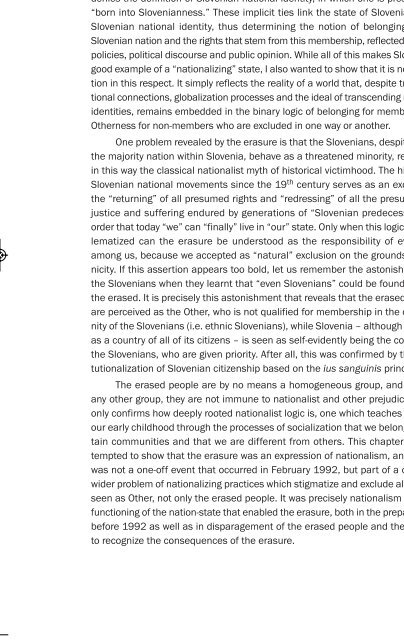The Scars of the Erasure_web
The Scars of the Erasure_web
The Scars of the Erasure_web
- No tags were found...
You also want an ePaper? Increase the reach of your titles
YUMPU automatically turns print PDFs into web optimized ePapers that Google loves.
<strong>Erasure</strong>_4a 10.1.11 20:29 Page 214214 THE SCARS OF THE ERASUREas an important component <strong>of</strong> <strong>the</strong> establishment <strong>of</strong> <strong>the</strong> Slovenian nation-state, Iwas able to focus on <strong>the</strong> <strong>of</strong>ten overlooked nationalizing practices involving <strong>the</strong>nationalist construction <strong>of</strong> “Slovenianness” as <strong>the</strong> idea and essence that at <strong>the</strong>same time irreversibly determined Slovenian statehood. <strong>The</strong> ethnic principle underlies<strong>the</strong> definition <strong>of</strong> Slovenian national identity, in which one is presumably“born into Slovenianness.” <strong>The</strong>se implicit ties link <strong>the</strong> state <strong>of</strong> Slovenia to <strong>the</strong>Slovenian national identity, thus determining <strong>the</strong> notion <strong>of</strong> belonging to <strong>the</strong>Slovenian nation and <strong>the</strong> rights that stem from this membership, reflected in statepolicies, political discourse and public opinion. While all <strong>of</strong> this makes Slovenia agood example <strong>of</strong> a “nationalizing” state, I also wanted to show that it is no exceptionin this respect. It simply reflects <strong>the</strong> reality <strong>of</strong> a world that, despite trans-nationalconnections, globalization processes and <strong>the</strong> ideal <strong>of</strong> transcending nationalidentities, remains embedded in <strong>the</strong> binary logic <strong>of</strong> belonging for members andO<strong>the</strong>rness for non-members who are excluded in one way or ano<strong>the</strong>r.One problem revealed by <strong>the</strong> erasure is that <strong>the</strong> Slovenians, despite being<strong>the</strong> majority nation within Slovenia, behave as a threatened minority, reflectingin this way <strong>the</strong> classical nationalist myth <strong>of</strong> historical victimhood. <strong>The</strong> history <strong>of</strong>Slovenian national movements since <strong>the</strong> 19 th century serves as an excuse for<strong>the</strong> “returning” <strong>of</strong> all presumed rights and “redressing” <strong>of</strong> all <strong>the</strong> presumed injusticeand suffering endured by generations <strong>of</strong> “Slovenian predecessors” inorder that today “we” can “finally” live in “our” state. Only when this logic is problematizedcan <strong>the</strong> erasure be understood as <strong>the</strong> responsibility <strong>of</strong> everyoneamong us, because we accepted as “natural” exclusion on <strong>the</strong> grounds <strong>of</strong> ethnicity.If this assertion appears too bold, let us remember <strong>the</strong> astonishment <strong>of</strong><strong>the</strong> Slovenians when <strong>the</strong>y learnt that “even Slovenians” could be found among<strong>the</strong> erased. It is precisely this astonishment that reveals that <strong>the</strong> erased peopleare perceived as <strong>the</strong> O<strong>the</strong>r, who is not qualified for membership in <strong>the</strong> community<strong>of</strong> <strong>the</strong> Slovenians (i.e. ethnic Slovenians), while Slovenia – although definedas a country <strong>of</strong> all <strong>of</strong> its citizens – is seen as self-evidently being <strong>the</strong> country <strong>of</strong><strong>the</strong> Slovenians, who are given priority. After all, this was confirmed by <strong>the</strong> institutionalization<strong>of</strong> Slovenian citizenship based on <strong>the</strong> ius sanguinis principle.<strong>The</strong> erased people are by no means a homogeneous group, and as withany o<strong>the</strong>r group, <strong>the</strong>y are not immune to nationalist and o<strong>the</strong>r prejudices. Thisonly confirms how deeply rooted nationalist logic is, one which teaches us fromour early childhood through <strong>the</strong> processes <strong>of</strong> socialization that we belong to certaincommunities and that we are different from o<strong>the</strong>rs. This chapter has attemptedto show that <strong>the</strong> erasure was an expression <strong>of</strong> nationalism, and that itwas not a one-<strong>of</strong>f event that occurred in February 1992, but part <strong>of</strong> a complexwider problem <strong>of</strong> nationalizing practices which stigmatize and exclude all groupsseen as O<strong>the</strong>r, not only <strong>the</strong> erased people. It was precisely nationalism and <strong>the</strong>functioning <strong>of</strong> <strong>the</strong> nation-state that enabled <strong>the</strong> erasure, both in <strong>the</strong> preparationsbefore 1992 as well as in disparagement <strong>of</strong> <strong>the</strong> erased people and <strong>the</strong> refusalto recognize <strong>the</strong> consequences <strong>of</strong> <strong>the</strong> erasure.


